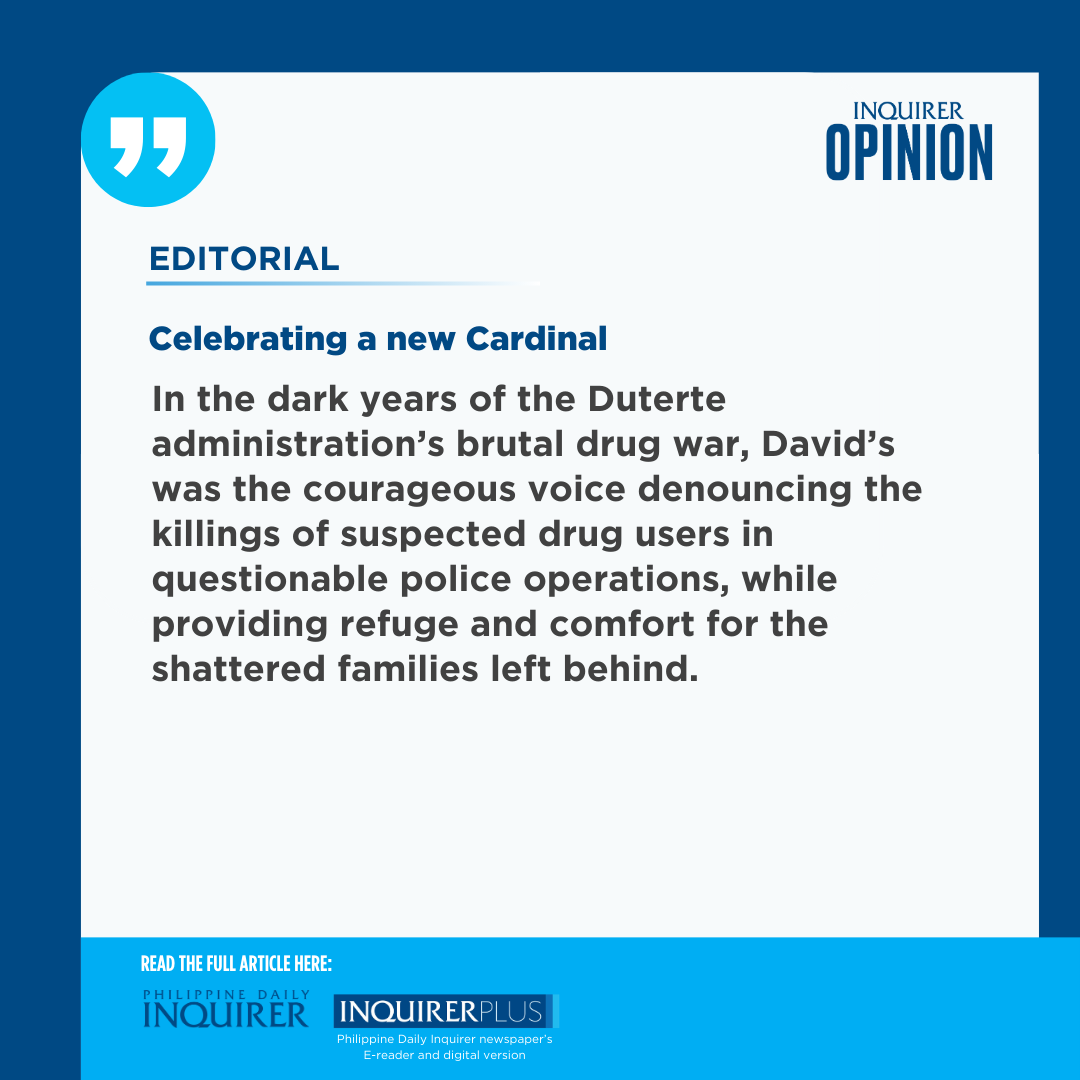It is joyful news indeed when Pope Francis announced on Oct. 6 the inclusion of Kalookan Bishop Pablo Virgilio David among 20 new cardinals from around the world, increasing this predominantly Catholic nation’s representation in the highest levels of the Vatican.
David’s elevation to the consistory of new princes of the Church is a source of pride for the country’s Catholic faithful, as it boosts the Philippines’ voice in the select group that has the ears of the Pontiff. Most significantly, David will now join the only two other Filipino Cardinals—Luis Antonio Tagle and Jose Advincula—in the Vatican conclave tasked with the most solemn job of electing a new Pope when the time comes.
David’s appointment becomes even more meaningful not just to Catholics, but to the country as a whole, because of what Bishop Ambo—as his parishioners fondly call him—has embodied in his ministry as a shepherd of his flock in our troubled times.
In the dark years of the Duterte administration’s brutal drug war, David’s was the courageous voice denouncing the killings of suspected drug users in questionable police operations, while providing refuge and comfort for the shattered families left behind.
‘Killing field’
David had described his diocese, comprising the cities of Caloocan, Malabon, and Navotas, as a “killing field” during the Duterte drug war, where 80 percent of the killings were done by masked men who turned out to be policemen. The most infamous case was that of 17-year-old Kian delos Santos who was killed in August 2017 after allegedly evading arrest. A CCTV footage later established that Delos Santos was shot by Caloocan cops as he was kneeling and pleading for his life. The cops were convicted the following year by a Caloocan court, which also belied police claims that Delos Santos was a drug courier.
Reflecting on Delos Santos’ killing, David noted: “I have the largest informal settlers’ community. These people are supporters of President [Rodrigo Duterte]. They feel betrayed, especially the family of Kian.”
Pointing out that drug addicts are not criminals but sick people who need help, David put up drug rehabilitation programs in his diocese, as well as mission stations to provide for the spiritual and physical needs of the poor and the oppressed. At his initiative, a “Dambana ng Paghilom,” or Shrine of Healing, was built on church property at the La Loma Cemetery where Delos Santos and other victims of extrajudicial killings (EJK) were buried. More than a resting place for the bereaved families of more than 300 EJK victims, the shrine has also become a venue to seek legal and psychosocial support for them.
In the crosshairs
This compassionate embrace for targets of the drug war put the soft-spoken bishop in the crosshairs of the Duterte administration. The president of the Catholic Bishops’ Conference of the Philippines once confessed to feeling conflicted in those dangerous times.
“I’ve always been low profile, but because of all these [killings] happening in my diocese, I really needed to take a stand and speak out,” David said in 2017.
For this, he received death threats and was even tagged a drug user by Duterte. “David! I’m beginning to suspect why you are frequently roaming at night. You could be into drugs,” Duterte said in one of his speeches. The bishop assured the public that he was not into drugs, “not even maintenance drugs.” He was also charged, with other Church leaders, with sedition which was eventually dropped.
Learning of his predicament, Pope Francis assured David in a meeting in 2019: “I know what you are going through. I am praying for you.”
The bishop’s elevation as cardinal has sparked hope in some sectors that it could somehow help in the search for justice for thousands of EJK victims and hasten healing for their families.
‘A pastor for the peripheries’
Said Fr. Flavie Villanueva, who worked with David in ministering to the families of drug war victims: “I believe that the newly designated cardinal would again be able to raise the issue of the drug war to the Holy Father, who could offer prayers, among other things, to help the thousands of families who are still healing and seeking justice.”
But the Pope’s personal interest in EJK victims takes a back seat to the celebration over David’s new position in the urban poor communities to which he has devoted his life.
As Inquirer columnist Randy David wrote so aptly of his brother: “A pastor for the peripheries—a shepherd for the lost, the least, the vulnerable, and the oppressed. That’s how I believe my brother, Bishop Pablo Virgilio David, or “Ambo,” has always understood his vocation.”
Indeed, Bishop David’s elevation to Cardinal fulfills a personal aspiration he once expressed, thus: “If the poor [will not] come to the Church, then the Church must go to the poor.”


